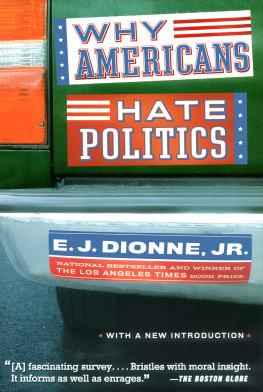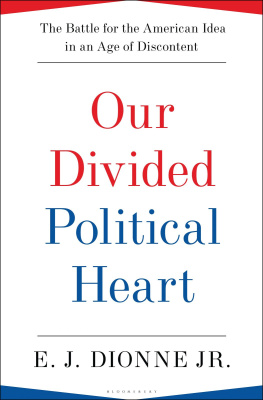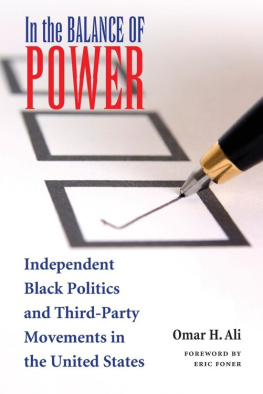Praise for Why Americans Hate Politics
Dispensing with the standard partisan punditry, E. J. Dionne cuts to the core of modern liberalism and conservatism and finds that both have squandered their best impulses. Yet the author resists despairfor he also suggests how Americans, by learning from the recent past, might recover a wider sense of republican adhesion and democratic commitment. Why Americans Hate Politics combines the realism of the precinct captain with a profound understanding of the role of ideas and ideologies in our public debates.
National Book Awards Finalist Citation
Splendid and thoughtful... Dionne makes a closely reasoned argument that the majority of Americans are fed-up-to-here with politics because their politicians quit on them.
George V. Higgins, The Washington Post
[A] broad and detailed intellectual history of liberalism and conservatism since the 1960s... An incisive book... A very fine guide to how liberals and conservatives ended up so rudderless in a world without Ronald Reagan, the Cold War, and the New Deal.
The Wall Street Journal
A book destined to become a classic in American political history.
Elaine Ciulla Kamarck, Newsday
Dionne is seductive, and his intelligent and well-written book should be consulted.... Dionne has sharp insights, and every civic-minded person would be better off for heeding them.
William F. Buckley, Jr., The Houston Chronicle
Dionne has done a fine job describing the frustrations of the public and the paralysis of government in what he calls the politics of false choices.
Ellen Goodman, The Boston Globe
An astute, entertaining analysis of the reasons that contemporary political debates and divisions misrepresent American issues.
The New Yorker
[A] rare and wonderful book which every citizen who ever voted will be happy she read and every stiff who has ever covered a political primary will wish he had written. Why Americans Hate Politics like American politics at its bestinforms, challenges, provokes and inspires.
Mark Shields, syndicated columnist
Why do Americans hate politics? Because they hate the false moralizing, the pandering, the divisiveness, the personal slanders, and the trivialization that now dominate the American election campaigns. E. J. Dionnes wonderful history of modern political ideas shows how this happened, places blame equally on all sides, and offers a simple lesson for a new politics of the nineties: Get serious.
James K. Galbraith, LBJ School of Public Affairs
A book that historians ought to envy. It offers a well integrated, carefully argued interpretation of a large chunk of our political history.
Christopher Lasch, Dissent
A gripping page-by-page analysis of what ails us. Neglect it not.
National Review
Dionne... is what a political reporter ought to be, a relentless seeker of that kernel of meaning that is the heart of fact. He has an old-time journalists ear for humbug, and he knows the importance of interests and power in political life.
Wilson Carey McWilliams, Commonweal
Thank you for downloading this Simon & Schuster eBook.
Join our mailing list and get updates on new releases, deals, bonus content and other great books from Simon & Schuster.
C LICK H ERE T O S IGN U P
or visit us online to sign up at
eBookNews.SimonandSchuster.com
CONTENTS
T O MY MOTHER AND FATHER, WITH LOVE
As long as people are people, democracy, in the full sense of the word, will always be no more than an ideal. One may approach it as one would the horizon in ways that may be better or worse, but it can never be fully attained. In this sense, you, too, are merely approaching democracy.
V ACLAV H AVEL
To the United States Congress
INTRODUCTION TO THE SECOND EDITION:
Do Americans Still Hate Politics?
T HIS BOOK IS IN PART a polemic and a call to political renewal. But it is alsoand, I have come to think, perhaps primarilya history of ideological politics in the United States from the 1960s forward. Its an attempt to explore the roots of todays politics by looking at the achievements and wrong turns of contemporary liberalism and conservatism. At the heart of Why Americans Hate Politics is the view that ideas shape politics far more than most accounts of public life usually allow. I believe ideas matter not only to elites and intellectuals, but also to rank-and-file voters. Indeed, I sometimes think that the rank and file see the importance of ideas more clearly than the elites, who often found themselves surprised by the rise of the movements that have shaped our politics since the 1960s. These movements usually arose from the bottom up. They were not imposed top down. Thats certainly true of the civil rights, feminist, and environmental movements and of the various antiwar rebellions. Its also true of the 1960s conservative insurgency led by Barry Goldwater, William F. Buckley Jr., and Ronald Reagan, the Christian Conservative and libertarian movements, and the various tax revolts that have rocked politics over the last three decades.
Of course, ideas are not all that matter in politics. Money and the power of interest groups matter, too. It would be naive to assert otherwisejust as naive as pretending that ideas dont matter. But even here, one can see in the reaction against the explosion of big-money politics the rise of another set of ideas in the political reform movement. This movement fueled John McCains candidacy in the 2000 Republican primaries, and its ideas played a central role in the appeal of all the Democratic presidential candidates in 2004. The fact that so many Americans see politics as dominated by wealthy interests that make large campaign contributions remains one of the central reasons why Americans continue to mistrust politicsand sometimes come to hate it.
But the central argument of this book is that liberalism and conservatism have long framed political issues as a series of false choices and that many of the problems in American politics could be traced to the failure of our dominant ideologies. Racked by contradiction and responsive mainly to the needs of their various constituencies, liberalism and conservatism prevented the nation from settling the questions that most troubled it. On issue after issue, this book insisted back in 1991, there was consensus on where the country should move or at least on what we should be arguing about; liberalism and conservatism make it impossible for that consensus to express itself. Voters were tired of the false choices presented by an ideologically driven either/or politics.
At its best, democratic politics is about what Arthur Schlesinger Jr. calls the search for remedy. The purpose of democratic politics is to solve problems and resolve disputes. But since the 1960s, the key to winning elections has been to reopen the same divisive issues over and over again. The issues themselves are not reargued. No new light is shed. Rather, old resentments and angers are stirred up in an effort to get voters to cast yet one more ballot of angry protest. Political consultants were especially ingenious in finding creative ways of tapping into popular anger about crime. Yet their spots did not solve the problem. Endless arguments about whether the death penalty was a good idea did not put more cops on the street, streamline the criminal justice system, or deal with the underlying causes of violence.
The decline of a politics of remedy created a vicious cycle. Campaigns became negative in large part because of a sharp decline in popular faith in government. To appeal to an increasingly alienated electorate, candidates and their political consultants adopted a cynical stance that, they believed with good reason, played into popular cynicism about politics and thus won them votes. But cynical campaigns do not lead to remedies. Therefore, problems got worse, the electorate became more cynicaland so did the advertising.
Next page





